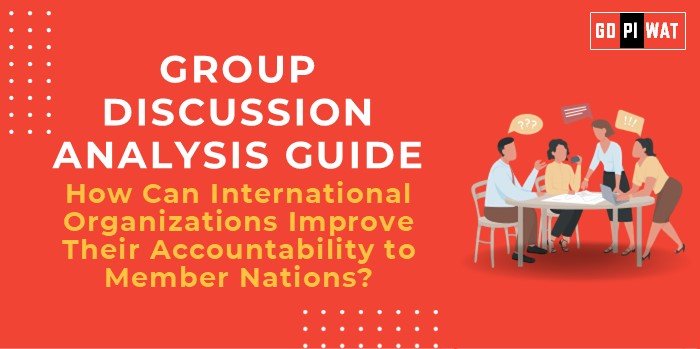📋 Group Discussion (GD) Analysis Guide: How Can International Organizations Improve Their Accountability to Member Nations?
🌐 Introduction to the Topic
- 📌 Opening Context: International organizations such as the United Nations, World Bank, and International Monetary Fund play a critical role in shaping global policies. However, their accountability to member nations often comes under scrutiny, raising concerns about equitable decision-making and resource allocation.
- 📖 Topic Background: The issue of accountability stems from structural imbalances, opaque decision-making processes, and a lack of effective grievance mechanisms for member nations. Improving accountability is essential to maintain trust and enhance the effectiveness of these organizations.
📊 Quick Facts and Key Statistics
🌍 UN Contributions: The US contributes 22% of the UN’s regular budget, leading to concerns about over-representation of major donors.
📉 World Bank Projects: Nearly 40% of World Bank-funded projects face implementation delays due to local resistance, reflecting poor consultation mechanisms.
⚖️ IMF Decision-Making: Weighted voting gives the G7 countries over 40% of total IMF votes, leaving smaller nations underrepresented.
📜 Transparency Index: Only 20% of international organizations meet high standards of operational transparency (Global Policy Forum, 2023).
📉 World Bank Projects: Nearly 40% of World Bank-funded projects face implementation delays due to local resistance, reflecting poor consultation mechanisms.
⚖️ IMF Decision-Making: Weighted voting gives the G7 countries over 40% of total IMF votes, leaving smaller nations underrepresented.
📜 Transparency Index: Only 20% of international organizations meet high standards of operational transparency (Global Policy Forum, 2023).
👥 Stakeholders and Their Roles
- 🏛️ Member Nations: Contribute funding, shape mandates, and oversee operations.
- 📋 Secretariats and Staff: Implement decisions and ensure operational transparency.
- 🌟 Donor Nations: Provide significant funding, influencing priorities and decision-making.
- 🌍 Developing Countries: Often seek equitable representation and developmental assistance.
- 🌱 Civil Society Organizations: Act as watchdogs, ensuring inclusivity and ethical operations.
🏆 Achievements and Challenges
✨ Achievements:
- 🌍 UN’s Human Rights Council: Provides grievance mechanisms for marginalized countries.
- 📊 World Bank’s Open Data Initiative: Enhances public access to project details.
- 🤝 UNDP Consultation Frameworks: Engage stakeholders from diverse regions.
⚠️ Challenges:
- ⚖️ Dominance of Powerful Nations: Influences agenda-setting disproportionately.
- 🔄 Lack of Feedback Systems: Smaller member states face difficulties voicing concerns.
- 💰 Inequitable Funding Structures: Create disparities in program effectiveness.
🌍 Global Comparisons:
- ✔️ Success: EU emphasizes internal accountability through parliamentary oversight.
- ❌ Challenge: IMF’s handling of debt restructuring faces backlash from developing nations.
Case Study: The African Union’s efforts to reform its funding model by increasing internal contributions to reduce dependency on external donors.
📢 Structured Arguments for Discussion
- ✅ Supporting Stance: “Enhancing accountability ensures fairness, improving the effectiveness of international organizations.”
- ❌ Opposing Stance: “Too much focus on accountability could delay decision-making, hampering timely responses.”
- ⚖️ Balanced Perspective: “A nuanced approach balancing transparency and efficiency is key to fostering trust.”
🧠 Effective Discussion Approaches
- 🎯 Opening Approaches:
- Statistical Impact: Highlight inequities in funding and decision-making power within organizations like the IMF.
- Case Study Opening: Discuss the African Union’s funding reform as a model for accountability.
- 🤝 Counter-Argument Handling:
- Example: “While decision-making delays are a concern, a lack of accountability undermines trust and participation from smaller nations.”
📊 Strategic Analysis of Strengths and Weaknesses
- Strengths:
- Global reach and resources.
- Established frameworks for development and conflict resolution.
- Weaknesses:
- Perception of bias towards donor nations.
- Bureaucratic inefficiencies.
- 📈 Opportunities: Digital platforms to improve transparency; reforms for equitable voting systems.
- ⚡ Threats: Rising nationalism and reduced funding commitments; lack of consensus on reform priorities.
🎓 Connecting with B-School Applications
- 💼 Real-World Applications: Relevant for courses on governance, public administration, and global trade.
- 📚 Sample Interview Questions:
- “What role do smaller nations play in reforming global organizations?”
- “How can private sector partnerships enhance international organizations’ accountability?”
- 💡 Insights for B-School Students:
- Explore cross-sector collaborations to strengthen governance.
- Analyze models of stakeholder engagement for inclusive decision-making.


